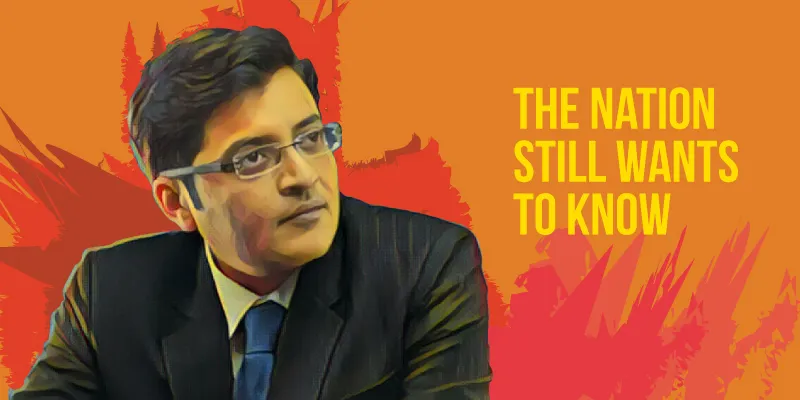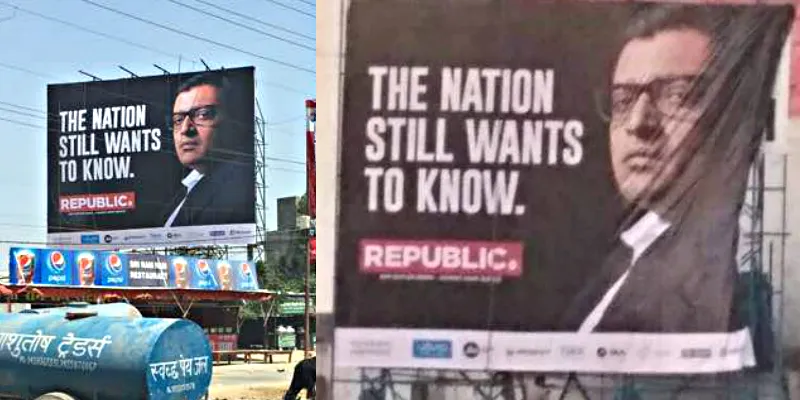The nation still wants to know: Arnab answers the legal notice, right outside TOI's Hyd office
What started as a battle of words at the Times Now newsroom has now escalated to a war of legal notices - one of the war-zones being the hoarding that the TOI office in Hyderabad overlooks. The spat took a spunky new turn when the highly disputed words 'The Nation (Still) Wants To Know' appeared sprawled across a hoarding outside the suing party's windows.

Many revelations surfaced and fingers were pointed in the six months following Arnab Goswami's announcement about quitting from his post of president and editor-in-chief of news channels Times Now and ET Now. The latest development in this issue is a legal notice served by Arnab's former employers to him regarding who has rightful ownership of the phrase 'The Nation Wants To Know'. This happens to be Arnab's catchphrase - which he popularised by repeating the words emphatically during his News Hour debates on Times Now.
To this, Arnab responded by hoisting a hoarding right outside the TOI office in Hyderabad, bearing the words 'The Nation Still Wants To Know'. He even announced this outdoor campaign on Republic TV's official Facebook page.
BCCL (Bennett Coleman & Co. Ltd.) had filed for a trademark for two phrases, namely 'nation wants to know' and 'the nation wants to know', in December 2016. In January 2017, ARG Outlier Media Pvt. Ltd, Republic TV's parent company, also mimicked the action and applied to trademark the same two phrases. As of now, neither of the two companies owns the phrase.
The Section 2 (zb) of The Trademarks Act, 1999, states that "A mark can include a device, brand, heading, label, ticket, name, signature, word, letter, numeral, shape of goods, packaging or combination of colours or any such combinations." While the clauses under The Trademark Act seem to indicate that the ownership of the phrase would lie with the employer even if the employee had come up with the phrase, legal experts argue that this is too generic a set of words, and it is difficult to allow either party to lay claim to it.
A few weeks ago, Arnab also talked about foul-play on the part of a media group, in an exclusive interview with YourStory. He claimed that the said media group was offering distributors months' worth of payment in advance in order to keep Republic TV off air.

Last week, the Times Group served a legal notice to Arnab regarding the usage of the phrase, which he rebutted with a Facebook post. Here is an excerpt from it:
"A media group has sent me a six page letter threatening me with imprisonment if I ever use the phrase 'Nation Wants to Know'. They say they own the phrase 'Nation Wants to Know'. I have watched the nervous antics of this media group with amusement and horror for the last few months. Today I am replying to them. In public. To them, I say: The threat of imprisonment will not deter me. Bring your moneybags and your lawyers, file the criminal case against me. Viewers, the phrase 'Nation Wants to Know' belongs to you, to me, and to all of us, every citizen of this country. It symbolises what we do, pick up issues for the people, ask, question and seek accountability where it is due. I have used the phrase with pride, in my reporting and on debates for the last 20 years. And I am deeply indebted to each one of you who have found my journalism worthy of representing public interest. Every Indian, through his or her questioning spirit, can use the phrase 'Nation Wants to Know'. And to the media group I say: Bring it On."
After that war cry came Arnab's outdoor campaign, with a play on the words ‘The Nation Wants to Know’, inserting a 'still' into the phrase, making it, 'The Nation Still Wants To Know'. This is no-man's land as far as this controversy is concerned - the words used show that they respect the legal battle that has not yet arrived at a verdict, while also indicating that they are standing their ground.







